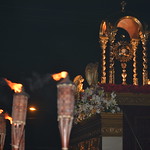Today we join the universal church in celebrating the wonderful presence of Jesus Christ among his people in an un-bloody manner under the species of Bread and Wine. The Eucharist that we celebrate so often is the greatest legacy that Jesus gave to his Church. However, we do not celebrate it as a memorial of the dead, but as a meal with the living Lord: as a celebration of people who have been brought from death to life, from darkness to light, and from slavery to freedom.
It is a piece of bread in which Jesus meets us again and again when we celebrate the Eucharist. It is a piece of bread in which we honor Jesus when we adore him in the monstrance. That piece of bread is Jesus himself. Jesus Christ himself commanded us to uphold his memory, to adopt his spirit, to emulate his attitude. As we celebrate the solemnity of the Body and Blood of Christ, we are being invited to see the Eucharist as the sacrament of sacraments and the mother of all sacraments.
Corpus Christi Sunday
The Eucharist is Christ Himself, the Author of grace. Other sacraments are actions of Christ, but only the Eucharist is Christ Himself, under the “appearances” of bread and wine. The Holy Eucharist, Vatican II tells us, is “the source and summit of the Christian life” (Lumen Gentium, no. 11; cf. Catechism of the Catholic Church, no. 1324). Since the Christian life is essentially a spiritual life, we might say as well that the Eucharist is the “source and summit of Christian spirituality” too.
To say the Eucharist is the “source and summit of Christian spirituality” means at least two things: First and foremost, that Christian spirituality flows from the Eucharist as its source, the way light streams forth from the sun. The Eucharist communicates Christ, the eternal Son of God, and the redeemer of the world. The Eucharist expresses the abiding presence of Jesus Christ in his church. Jesus therefore becomes for us the source of Christian spirituality, our starting point, the pivot of Christian life and our inner motivation. Secondly, that the Eucharistic Jesus is not only the foundation of the Christian life but the ultimate end of the Christian life.
We are here because of Jesus, whatever we do in this room, whatever we do outside of this room, the singing, the prayers, the offering, the sacrifices, indeed our entire life as Christians is oriented toward the Eucharist. All the sacraments are oriented toward the Eucharistic Jesus. Our Christian spirituality is supremely realized in and ordered to the Eucharist as its summit or high point – that to which all of our actions should ultimately be directed. We are Eucharistic people because of what we are celebrating today; the Body and Blood of Christ. The Eucharist is the language of the Church, it is our spiritual food, our spiritual security, our pledge of eternal glory and it is also the life that we live as a community.
A Knights Greatest Honor
As the source of Christian spirituality, the Eucharist revealed that our salvation begins with God, not ourselves. God offers Himself to man in Christ first. At the same time, as the summit of Christian spirituality, the Eucharist is man’s supreme, grace-enabled, freely given offering of himself back to God through Jesus Christ, our high priest, by the power of the Holy Spirit. Today, mother church invites us to contemplate on the Eucharistic Jesus, his abiding presence in the church and in our lives, how much he loves us to the extent that he is prepared to be our spiritual food.
As we celebrate our communion with the Lord, we are not only being called upon to admire and reverence the Eucharistic species, but we are also being challenged to live and radiate the Love, the unity, the holiness, and the dignity that the Eucharist signifies. How much do we desire the Eucharist in our lives? Are we able to live the mysteries that we celebrate each day as Eucharistic people? How much are we prepared to sacrifice and how many miles are we ready to tread for the sake of the Eucharistic Jesus? Are we always ready to listen to Jesus who offered all that he had for our salvation and are we ever ready to obey his instructions. May the Eucharistic Lord accompany us always, and may His abiding presence protect us from evil. Amen.


Recent Comments